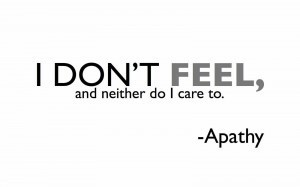Self-Deception & the Need for Self-Actualization by Chessa Peak
Part 2 of a 3 part series, read part 1 here
 Through conditioning and habit, people learn from each other what is acceptable behavior and what is not. When involved in a humorous story, the parties involved will laugh together. Similarly, when involved with dysfunctional thinking the tendency is to be dysfunctional. The environments people place themselves in dictate their behavior. How we behave in relation to others can also be seen in examples of groupthink psychology.
Through conditioning and habit, people learn from each other what is acceptable behavior and what is not. When involved in a humorous story, the parties involved will laugh together. Similarly, when involved with dysfunctional thinking the tendency is to be dysfunctional. The environments people place themselves in dictate their behavior. How we behave in relation to others can also be seen in examples of groupthink psychology.
The idea that like attracts like is also the basis for the concept of the law of attraction. The connections we seek out, whether in groups or individuals, are validations of ourselves offered through the reflection of ourselves in others. When we seek this validation of self externally, it is possible to become a person who seeks their happiness in those around them and not from within. This is especially true for people with low self-esteem or low self-worth. Because they are not happy with themselves, they look for their happiness in others. Through repetition, destructive behaviors become habit.
 Apathy, unwillingness, and excuse making exist due to a lack of sufficient motivation. One then needs to define what motivation means to the individual. Perhaps there is a disconnect in intimacy between two people because one is not properly motivating the other in a loving manner. Like a child not getting what they want, it throws a tantrum. When our wants are not meet we behave in ways that normally we would never act. Grasping for attention, becoming resentful when we don’t get what we want. Which in turn will cause a partner to withdraw their affection. Which in turn causes the other to become more resentful.
Apathy, unwillingness, and excuse making exist due to a lack of sufficient motivation. One then needs to define what motivation means to the individual. Perhaps there is a disconnect in intimacy between two people because one is not properly motivating the other in a loving manner. Like a child not getting what they want, it throws a tantrum. When our wants are not meet we behave in ways that normally we would never act. Grasping for attention, becoming resentful when we don’t get what we want. Which in turn will cause a partner to withdraw their affection. Which in turn causes the other to become more resentful.
Adversely, it is just as common to force an interaction the does not exist or to read more into a situation based on our emotional wants dictating our needs for love, loneliness, communication, affection, and reciprocation such as in the situation above between two lovers. One partner may make a reasonable request that is never met. The person making the request will then try other ways of convincing the partner that they should meet this request. If sufficient motivation is not there for the need to be meet then it will be ignored. This could be because the other person genuinely is not concerned with the need to satisfy any other needs than their own. Once this conclusion is determined the question then should be asked, “Is this situation really good for you?”.
Once locked in the cycle of negative thoughts, we become consumed with doubt, fear, aggression, and aversive tendencies when dealing with the reality of our lives. So what then are some things that contribute to this kind of negative psychological conditioning? In American society, there is no emphasis to understand that negative occurrences are a part of life. On the contrary, we are taught to “let the good times roll” and that not feeling good is bad. This understanding that good feelings should not end has caused a need to be excessive in what feels good.
We immerse ourselves in what feels good even if it is bad for us such as with alcoholism or drug addiction. Physiological conditioning as a result of how we were raised also influences the decisions we make as adults. Subconsciously we are drawn towards people who mirror what we are comfortable or familiar with. Patients who suffer from physiological disorders such as chronic pain, may experience severe mood swings as a result of their condition as well.
References for the Lost and Found articles can be found here.
*****
[contact-form to=’communitypublishingabq@gmail.com’ subject=’Subscriptions’][contact-field label=’Enjoyed this article? Type in your email address to receive similar articles, no ads, no spam, no charge!’ type=’email’/][/contact-form]
 Chessa Peak has been in New Mexico since the age of 4 and is an honorary New Mexican. A bartender of over 10 years in the Duke City, musician, entreprenuer, and current student at CNM, Chessa is now currently working towards her own non-profit group that will support literacy, art and music programs for Albuquerque residents and her immediate community. Having come through a negative past, her writings deeply reflect the nature of her personal struggles in an attempt to help others overcome their personal battles.
Chessa Peak has been in New Mexico since the age of 4 and is an honorary New Mexican. A bartender of over 10 years in the Duke City, musician, entreprenuer, and current student at CNM, Chessa is now currently working towards her own non-profit group that will support literacy, art and music programs for Albuquerque residents and her immediate community. Having come through a negative past, her writings deeply reflect the nature of her personal struggles in an attempt to help others overcome their personal battles.
Community Publishing brings local artists of all mediums together in creative collaborations for distribution as multimedia books while promoting literacy in our communities. #JoinOurCommunity at http://communitypublishing.org We are proud to be Marketers for the Rail Yards Market.


















